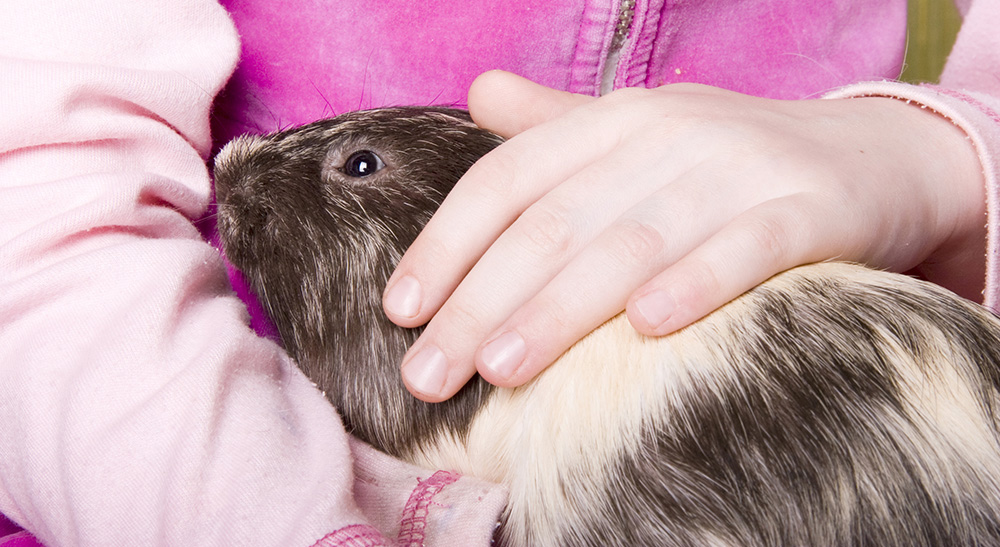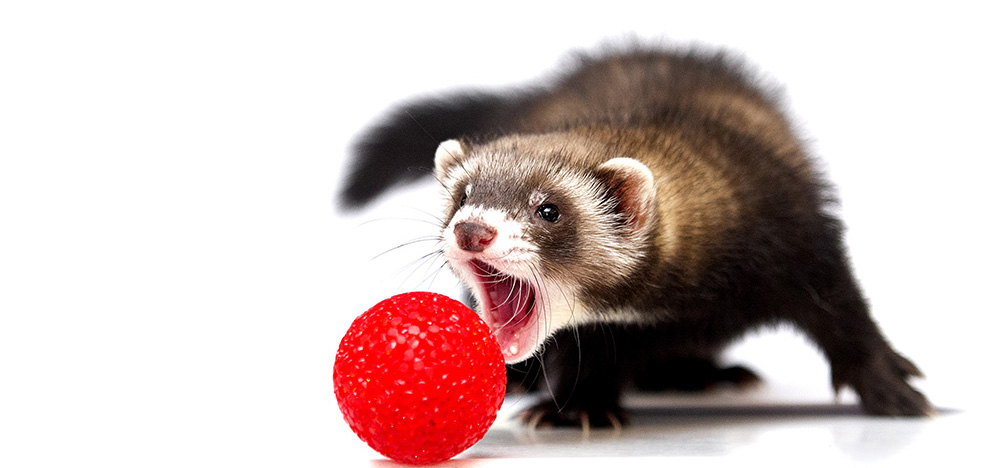 Guinea pigs adore being adored Guinea pigs adore being adored
|
Just as the family dog or cat became ubiquitous with American culture after the end of World War II, as people have moved from rural to urban areas, into smaller homes and apartments, our choice in companion pets has changed, as well: hamsters, ferrets, guinea pigs, rats and other furry critters have become mainstream pets over the last four decades, much to the delight end education of millions!
And why not? Aside from being great fun to interact with and observe, they are typically independent, easy and inexpensive to care for, quiet (very important in an apartment!), and don’t take up much space -- a perfect companion for many people’s busy lives.
 It is hard to match the exuberance of a ferret at play! It is hard to match the exuberance of a ferret at play!
|
Of course, the idea of a "low-maintenance" pet is relative. Taking care of any animal is a big responsibility; your hamster will not demand that you take her for a daily 5 mile jog like your German Shorthaired Pointer, but she will absolutely need daily socialization, and depends entirely on you to keep her entertained, fed, healthy, and clean!
So before you pick out a small animal, make sure you understand the responsibility, and what is required of you to be a great pet owner! A hamster and gerbil may look similar, but they are different species, with several important differences between them, so make sure you research the following before you bring one or more home:
- What is the minimum recommended housing for this critter? Do I have the space to set it up and properly maintain it? Does the cage provide enough ventilation? Are the spaces between wiring and/or other openings large enough for my pet to push through or get injured?
- Does the interior of my pet’s cage provide a safe and stimulating environment? Make sure the bedding material is safe, that there are enough suitable toys, tunnels, and hiding spots – and remember to consider the objects relative to the size of your pet: a dwarf hamster might love a mini-sized exercise wheel, but it will be far too small for a chinchilla to use.
- How often will the housing need to be cleaned, and by who? Some types of pet are naturally messier or more fastidious than others, but all of them rely on you to provide a healthy environment. Make sure there is an agreed upon plan in place before you bring any pet home, so there are no arguments (or delays) in keeping the cage clean!
- Do the pets I’m interested in need to be held and interacted with a lot, or are they more independent? Can I realistically be counted on to devote enough time each day? If I regularly spend time away from home (meaning only their feeding and perhaps cleaning will be attended to), will they miss me? If I regularly have people coming and going through my home, will it stress them?
- What is the recommended diet for this pet? Is it an herbivore? Omnivore? Obligate Carnivore? How will I meet my pet’s nutritional needs?
- Does the pet I’m interested in require regular grooming in order to keep nails down, avoid knots in hair, or reduce odor?
- How long should I expect my pet to live? A rat may live two years, while some exceptional ferrets have lived up to 12 years of age – if that’s the case, don’t plan on moving any time soon to a state or municipality where ferrets aren’t welcome!
- Will my pet be happy living alone, or in a group? A hamster might be happy alone, so long as their environment is stimulating and you provide enough attention, but a gerbil needs company. And some, like rabbits or ferrets, can be happy alone or in a group, depending on the situation and individual animal. For animals that prefer living in groups, it is important to be sure they are properly socialized with one another, and to house the same sex -- and be aware that for some (e.g. gerbils) females may have difficulty getting along together, while in others (e.g. mice), males may fight.
Depending on your perspective and experience owning pets, this may seem like common sense advice, or it may seem like owning a guinea pig is way more complicated than you originally thought, but regardless, starting out on the right foot, and understanding the commitment you are making before you’ve actually brought your pet home is the best way to shape your decision and start out on the right foot!
 This guide proudly presented as part of NAIA's mission to promote and preserve domestic animals. This guide proudly presented as part of NAIA's mission to promote and preserve domestic animals.
|

 Guinea pigs adore being adored
Guinea pigs adore being adored
 It is hard to match the exuberance of a ferret at play!
It is hard to match the exuberance of a ferret at play!
 This guide proudly presented as part of NAIA's mission to promote and preserve domestic animals.
This guide proudly presented as part of NAIA's mission to promote and preserve domestic animals.
 Discover Animals is a web-based educational resource offered by the NAIA
Discover Animals is a web-based educational resource offered by the NAIA